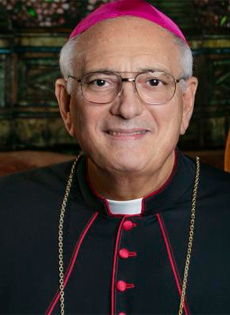
New study on Catholic attitudes on migrants, immigration and refugees
Monday, September 23, 2024
*Bishop Nicholas DiMarzio
The Center for Applied Research in the Apostolate (CARA), affiliated with Georgetown University, last month published a study on Catholic attitudes toward immigration, migrants, and refugees. It is a significant study, not just about attitudes on migrant issues but also about Catholic attitudes on other social issues. Catholic social teaching has been a concerted effort of the Church to apply moral teaching to everyday life issues.
In my opinion as a social work researcher, the methodology used in the study is excellent. The sample of almost 1,400 people reflects almost all the characteristics of U.S. Catholics in geographical location, age and political/psychological orientation.
Insights from CARA’s recent study
In general, my conclusion would be that many Catholics somewhat know Catholic teaching on these issues but may be more influenced by their political, familial and psychological orientations. One exception may be the “young active Catholics” whose attachment to Catholic social teaching is amazing, with almost 90% influenced by what the Church teaches. Another important factor is their practice of Mass attendance, which seems to correlate with knowledge and acceptance of Catholic social teaching.
The purpose of this column has been not only to inform Catholics about Catholic social teaching but also to share facts about the complex social issue of migration, immigration and refugee resettlement. It seems Catholics are not totally ignorant of Catholic social teaching in this area but are more influenced by other factors. In general, immigration is not at the top of the list of most important issues. More important to many is the institution of marriage, the environment and abortion.
In a series of 34 questions, researchers teased out the prevailing attitudes of four groups of Catholics: conservatives, young active Catholics, progressives and left-leaners. Most of the groups are equally represented in the survey, with conservatives making up about 10% more.
Key findings on immigration and refugee issues
Some significant findings would include: 57% would like to see immigration kept at its present level or increased; almost 77% believe it is good or a mixture of good and bad for our country; 34% consider the situation at the Mexican border to be a crisis, with 40% considering it a major problem and 20% a minor problem.
Sympathy for undocumented aliens varies from very sympathetic (21%), somewhat sympathetic (37%), unsympathetic (16%), and very unsympathetic (20%). Likewise, attitudes toward Central American refugees or asylum seekers closely follow the same pattern. One very interesting finding was discovered by using the biblical story of the flight of the Holy Family into Egypt, which was not the result of a free decision. The question asked whether the decision to migrate should always be free. Among the respondents, 63% said it should very much or somewhat reflect freedom, 24% thought it should be a little reflective of free choice, and 13% said not reflective at all. This is the crux of the problem of forced migration, which is totally at odds with Catholic social teaching.
Another key teaching regarding the right to migrate, subject to judicial conditions and a sovereign country’s right to uphold its borders, was understood by only 61% of the respondents as very and somewhat reflective of Catholic social teaching, with 39% believing it is little or not reflective of a key teaching.
Faith’s influence on opinions about immigration
The Church has never taught that open borders are the preferable paths for migration, an issue greatly misunderstood today. Another key question is to what degree does your Catholic faith inform your opinions about immigrants and refugees, with the following result: 19% very much, 35% somewhat, 19% a little, and 27% not very much.
At least 46% of our Catholics need better instruction on what the Church teaches so that their opinions on migration will be informed by Catholic social teaching. This gives me more reasons to walk with migrants and to keep on writing these monthly columns.


Comments from readers